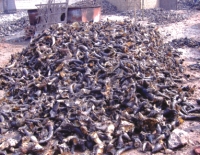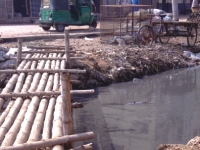|
Special Feature
Hajaribagh's Smelly Hell-hole
Durdana Ghias
 |
Workers sorting out various annimal parts in a dank environment. |
When I was assigned to do a story on the processing of animal remains after they are slaughtered. Little did I know that this would be a lesson in reality. Enthusiastic at first at the prospect of doing a new story (or a probable lead) I was oblivious to the unpleasant sides.
Usually, I did stories on traditional professions dying out in the face of modernism; I took interviews of famous people like the British High Commissioner Anwar Hossain Choudhury and renowned actor Aly Zaker. I went to their plush offices, awed to be able to talk with such high profile personalities.
In a word I was living a happy journalistic life without having to face anything unpleasant. The worst places I had been to where some (not all) government offices where people were very reluctant to talk to the media.
This story was about processing the remains of cows or bulls (excluding the hide) after it is sacrificed. These parts are the genitals, bones, horns, hooves, tails and ears. Around 2,500 people of Dhaka city (Lalbagh and Hajaribagh) are involved with this extremely unpleasant process.
 |
Bhola Mia's factory. |
It was very difficult to contact the traders because it is a very informal sector and those involved in it are small businessmen with no association of their own. I called some tannery owners but they could not give me any clue. So I had to go there myself.
I went to Hajaribagh but I could not locate the people and places where this kind of recycling had been going on. There were only big tanneries. I came back to the office where my in-charge showed me some pictures he had taken that morning while walking through the area! He told me that Hajaribagh is a big area and that place is beyond the tanneries and near Kamrangir Char.
There was a blockade on that day. I was waiting for another reporter to accompany me. She came at 10:30 in the morning in a CNG with a red banner reading 'joruri shongbadpotro' or emergency press.
 |
A little boy, who grew up in Hajaribagh, smiling in an atmosphere where it is difficult to breathe. |
Meandering our way through Mirpur Road, Dhanmondi, Saat Masjid Road, Jigatola and the winding alleys of Rayer Bazar we ended up in front of Shikdar Medical College. Then we started towards Kamrangir Char. I had been told that the smell of the air would tell us whether we had reached our desired place. So we started sniffing our way as we moved on.
When the air reached my nostrils the first instinct was to throw up. I had been fore warned of the bad odour but I had no idea how strong the stink could be. I was not sure for how long I would be able to stand it without throwing up. The place where the tanneries are is heaven compared to that area.
We got down and started looking for an appropriate person to talk to. We found Bhola Mia, a big trader of cattle parts, sitting in his factory which was on the other side of a bamboo bridge.
The bridge was without banisters so Mitu, my colleague, and I held each other's hand to cross the bridge under which black water was flowing. I was thinking that if Mitu or I slipped then both of us would fall in the water, which looked like liquid coal. This water was pouring out of the tanneries as effluents.
 |
A pile of horns and hooves. |
Crossing the bridge we landed on a patch of ground that was apparently Bhola Mia's headquarters. Bones and horns were piled up in that place along with animal genitals hanging from the walls of rickety shacks.
He greeted us and asked whether we were from a TV channel. When we replied in the negative he seemed a bit let down. The reign of the electronic media has made us print journalists quite boring compared to the known faces on TV. But he gave us chairs to sit on and was very responsive to our queries. He has deals with two thousand scavengers who collect remains of sacrificed animals for him. Before independence this trade was in the hands of Punjabis. Later Bangalis took over the business.
According to him bull genitals have a very good demand abroad. They are exported to Burma where these are processed with medicine and exported to China.
Bhola Mia said that no part of the animal is thrown off unused. Hard parts like bones, horns and hooves are used in making things like combs, buttons, X-Ray films and capsule shells and exported to Japan. Poultry feed and glues are made from the ears.
He offered us some tea. I wondered how I would drink the hot liquid when I could hardly breathe. But I had to drink it because otherwise it would prove that I thought they were unclean. And the last thing I wanted to do was to offend such brave people.
I took a few pictures of the factories where people were working. There were around 200 families living in that area whose children also live in that place. To see me taking pictures a child ran up the bridge and stood smiling up to me to take his picture.
 |
The bamboo bridge to the factory. |
IT was hard to believe that this child was growing up in an atmosphere where the air and water reeked. But he was oblivious to it and playing on the nearby street breathing the stale air. The air they were inhaling every moment I found the same air stabbing my lungs out. The air and water were so polluted that no plant could live in that atmosphere.
We went to the place where the workers were sorting out ears, horns and hooves. They were crouching on dank soil sodden with cow blood and waste fluids while the air reeked of bovine remains.
Suddenly one of the workers said: “How can you stand there like this? Can you stand the air?”
I stared at him and almost said “No” but caught myself at the last moment and he went on: “You can stand it because it is winter if it had been summer you would have run off.”
“I feel like running off,” I said to myself but I had to finish my job before that.
The stench was literally assaulting my breathing system and it became very difficult to inhale. I was feeling the heavy air stealing down my trachea and filling my suffocated lungs.
I felt miserable. But I did not know for whom. For me because I had to stand there fighting every moment to stop myself from at environment? throwing up? Or to see them working and living with their families in that environment?
These people resorted to this job because they are poor and have no other expertise; this work needs no skill at all.
I do not know why we should sit in our cozy homes and cool offices without thinking for a while about these poor people who work hard day and night regardless of Eid holidays, to keep the city clean.
Why we should not think for a while about this fact that the amenities of this city are available because of them. We can breathe a puff of clean air because they are working in the midst of stinking air and a severely polluted environment.
When we got back in Karwan Bazar the big trash bin seemed almost fragrant. I know it sounds ridiculous but this is exactly what I was thinking. And after I had been home, every moment was blissful. I was contemplating how I can thank God for being able to breathe air free from any putrid particles.
For the first time in my sheltered life I saw a harsher side of living and it jarred my eyes open to a ruthless reality.
The writer is a reporter of Star City.
Photo Credit: Durdana Ghias
Copyright
(R) thedailystar.net 2007 |
